- Home
- Scott Westerfeld
Afterworlds Page 9
Afterworlds Read online
Page 9
“So how many of you ghosts are there? I mean, is the whole world haunted?”
Mindy shrugged. “Most places, not so much. In this suburb I’m mostly alone, because no one remembers their neighbors. But little towns . . .” Her voice dropped a little. “They’re crawling with whispers.”
A knock came at the door, and I jumped a little.
“It’s just Anna,” Mindy said.
I tried to keep my voice steady. “Yeah, Mom?”
She opened the door, her eyes scanning the room. “Um, were you talking to someone?”
“I wish. No phone.” I tried not to look at Mindy. “I was just singing along with something.”
Mom looked at my laptop, which was shut. Other than my phone, it was the only thing I ever played music on.
“Something in my head,” I clarified, pushing wet hair behind my ears.
“Okay.” She gave me a nervous look. “I thought we might make pasta tonight. From scratch, with squid ink. I’ve got the island all cleaned off so we can make a mess.”
“Perfect time to make a mess. I just took a shower.”
My mother hesitated, so I smiled again to show I was kidding, still managing not to look at Mindy. After what I’d been through, it wouldn’t take much to convince my mom that I was going crazy.
“Great! I’ll go start the sauce,” she said, and shut the door.
“Mmmm . . . spaghetti,” Mindy said.
I looked at her. “Ghosts can eat?”
“We can smell,” she said.
“Oh, right.” I was whispering now, convinced that my mother was outside with her ear pressed against the door. “But you have to stay in here while we cook. I’m not used to this invisible friend thing yet, and I don’t want to look insane in front of Mom.”
Mindy pouted, running a palm across the bedspread as if she were smoothing it out. But the wrinkles stayed. It had to be frustrating, being shut off from the world of objects and people, unable to connect.
“That’s not very nice of you,” she said. “Now that you’re a pomp, we should be friends.”
“But Mom’s going to want to talk about stuff. She always gets deep and meaningful when we cook. And I won’t be able to concentrate if you’re hanging around. So please?”
“I’ll sit in the corner and not say anything. Promise!”
I hesitated, wondering how reliable Mindy’s promises were. She might be two months older than my mother, but she still talked like an eleven-year-old. I wondered if ghost children never grew up.
“If you let me hang out, I’ll tell you a secret,” she offered.
“Awkward details from my mother’s childhood? No thanks.”
Mindy shook her head. “It’s something really important. Something you need to know.”
“Okay, I guess.” Mindy knew more about the afterlife than I did. And given Yamaraj’s warnings about dangers and predators, it wouldn’t hurt to learn more. “What’s your big secret?”
“There’s a man watching our house,” she said. “He’s been there for three days.”
* * *
I took the backyard path, the recycling bin trundling behind me. My mother had seemed a little surprised when I’d volunteered to take it out, but she hadn’t argued.
Mindy was walking ahead, checking that the way was clear, but my nerves were jumping. I had no reason to trust Mindy. My mother had never even mentioned her. What if there wasn’t anybody watching the house, and this was some kind of . . . ghost trap?
But what else could I do? Pretend Mindy hadn’t said anything?
“He’s not in the back lane,” Mindy said from the other side of the gate. “He usually parks his car in front of the Andersons’ house.”
“Who are the Andersons?”
“You don’t know our neighbors very well, do you?”
I didn’t answer, pulling open the gate and rattling the bin into its usual spot in the back lane. Ghosts had plenty of free time on their hands, I supposed, and spying on the neighbors was probably more interesting than staring at the walls of my mother’s closet.
With a glance at the house to make sure Mom wasn’t watching, I headed up the lane, staying a good distance behind my ghostly escort. Out here in the daylight, Mindy looked more out of place than she had in my bedroom. It wasn’t just her bold checked shirt and wide 1970s belt. The way the late-afternoon sun played on her looked wrong.
And then I realized it—she had no shadows. Not just the big shadow that should have been rippling along the ground beneath her, but all the little ones in the wrinkles of her clothes were missing. The sunlight didn’t texture her the way it would have a living person.
I’d found a way to spot ghosts, at least in daylight.
From the end of the back lane we could see the car, a black sedan with California plates.
A young man with dark hair sat in the driver’s seat, a tablet computer of some kind propped on the steering wheel. He was reading from it, tapping on the screen, but then his eyes lifted to peer at my house. After a long moment, his gaze fell back to his tablet.
“Crapstick,” I whispered. “You weren’t kidding.”
“I don’t kid about scary men,” Mindy said.
I stood there, willing my heart to slow down. “Can you go see what’s on his screen?”
Mindy looked at the ground, kicking without effect at a dry leaf blowing past. “I’m kind of scared of him. Can you come with me?”
“Um, not invisible. Remember?”
“But you’re a pomp.” She frowned. “Can’t you cross over?”
“You mean, into the afterworld?”
She giggled. “Just call it the flipside. Dork. That’s what you say when you’re walking around up here, and not down in the underworld.”
“Okay, the flipside.” I wondered if I could manage right here in the alley, or if I even wanted to. That meant remembering what had happened at the airport, replaying it all in my mind again. “Maybe.”
Mindy cocked her head at me, wondering if I was kidding. When my expression didn’t change, she held out a hand.
I took it a little hesitantly, and felt the distant tingle of her palm in mine. The cold place inside me responded to her touch, swelling into icy fingers that stretched around my heart. The earth seemed to sink beneath my feet, like when an elevator begins its descent.
It was happening again, right here in my back lane.
I almost dropped Mindy’s hand, but she squeezed tighter—suddenly her small fingers felt real and solid. The cold inside me pulsed and surged, sweeping through my body. It flooded my head and fell across my senses, turning everything gray and quiet.
The afterworld air had its familiar taste, like I was holding a rusty nail under my tongue. The dead leaves stirring around our feet were silent.
“Huh.” My own voice sounded distant in my ears. “It’s not usually that easy.”
“Maybe because you’re new.” Mindy had turned gray, like the rest of the world. “But the man can’t see you now. You’re just like a ghost.”
I looked around, breathing hard. It was strange seeing my own neighborhood turned colorless and flat, like the airport. I realized that Mindy was the opposite of Yamaraj. Her touch had pulled me over to this dead, gray place, while his had sent me back to the world of the living.
I took a few cautious steps. My feet felt numb, as if they’d fallen asleep. When I stamped my bare soles against the asphalt, I felt only a dull ringing in my feet.
I hadn’t noticed any of this the first times I’d crossed over. Maybe I’d been in shock. Or maybe it was different when Yamaraj was there beside me.
“This is weird,” I said.
“Sucks to be dead,” Mindy agreed. Then she saw my expression and added, “Not that you’re dead. You’re just a psychopomp.”
“I think maybe I’m going to use another word. One that’s less . . . psycho.”
She shrugged. “That’s what everyone calls them.”
I looked at the black sedan
again. My shaky first steps had taken me out into the road a little, but the man hadn’t looked my way. Of course, the terrorists hadn’t been able to see me at the airport. One had walked straight through me.
But Mindy’s touch had made it seem too easy. “You’re sure I’m invisible?”
Mindy nodded. “Does he look shiny to you? No way can he see the flipside.”
I looked at my own hand. The shine wasn’t as radiant as on Yamaraj’s brown skin, but it was definitely there. My shadow had disappeared completely.
“Okay, invisible,” I murmured. “Sweet.”
I walked out from the back lane and toward the black sedan. The man’s gaze stayed on his tablet, even when I stood right in front of his car.
Finally his eyes flicked up at me, but they registered nothing, peering straight through me to my house beyond.
Mindy came up timidly beside me. “He’s scary, right?”
“He’s stalking my house. What do you think?”
I went to the driver’s side and knelt, looking straight at the guy. It was almost intimate, being this close without him seeing me, like spying on someone through a one-way mirror. I could hear him breathing through the open window, and could smell his coffee in the cup holder below the car window. He looked younger than I’d thought at first, in his midtwenties, maybe. He wore a dark suit and tie, and thick-framed nerdy glasses.
“What’s he doing with that computer thing?” asked Mindy.
I looked at her. “You mean his tablet?”
She gave me a shrug, and I wondered how much of her understanding of the world was stuck in the 1970s.
I leaned in closer, my lips only inches from his ear.
“Hey, dipwit!”
His long eyelashes blinked once, but otherwise he didn’t respond. I let out a nervous laugh, then leaned farther into the car, trying to read from his tablet.
On his screen was a list of emails. My eyes darted through the subject lines. Nothing weird—a reminder about a party, someone asking for a missing file, and the usual smattering of spam. He tapped at one of the emails, and it expanded to fill the screen. I leaned in closer to read, my cheek almost pressing against his.
Maybe I brushed against him then, or maybe it was just a coincidence, but at that exact moment he decided to scratch his ear. The back of his hand slid across my cheek, leaving sparks and tingles in its wake. I startled, pulling away, and banged my head on the top of the car window.
“Crap!” Anger surged through me.
Mindy stumbled back from the car. “We should run!”
“Run? What do you . . . ,” I began, but already it was happening—the world brightened around me, the gray wash over my vision peeling away. Warmth flooded into my body, and I sank to one knee, dizzied by the onrush of light and color, gulping in the air that suddenly tasted fresh and real.
“Come on, Lizzie!” Mindy shouted, already running away.
A moment later I was sitting there by the stalker’s car, blinking in the bright, all-too-normal sunshine, and he was staring down at me with his eyes wide open.
CHAPTER 11
THE MORNING AFTER YA DRINKS Night, Darcy sat up in bed to discover that she had a hangover. She was still wearing the little black dress, to which clung an inescapable whiff of beer. Her first instinct was to lie back down again, but by then the bed was spinning.
Her first few minutes upright were difficult, but once Darcy had a bathrobe on and coffee in hand, her condition began to shift from dizzy to quietly philosophical. The churning of the world outside Moxie’s ten-foot-high windows proved soothing. Airplanes drew stately contrails across the sky, and a steady flow of cars and taxis headed northward toward the spires of Empire and Chrysler. Darcy watched the people sifting through Astor Place from a writerly remove, telling stories about them for her own amusement.
The refrigerator contained only batteries, mustard, and makeup and the pantry held even stranger things, like canned truffles and pickled quail eggs. But while starting up the house wifi to search for nearby food, Darcy found a sheaf of menus on Moxie’s desk. These offered breakfast, lunch, and dinner all delivered to the door, which was exactly what Darcy needed.
After ordering breakfast, she had an intense conversation with Sodapop about how birds couldn’t talk, then connected to You_Suck_at_Writing. There were emails from Carla, Sagan, and Nisha, and she replied to them all with the story of having met Kiralee Taylor, Coleman Gayle, and Oscar Lassiter in the flesh. Indeed, she hadn’t just met these writers, but had discussed superpowers and book titles and cultural hijacking with them. Darcy tried to convey how intoxicating it all had been, while only hinting at how terrifying.
Her mother had also sent an email, making sure that Darcy hadn’t been mugged or murdered overnight. Darcy thanked her for the little black dress, and managed to mention that she’d gotten home before eleven the night before. Then she replied to Aunt Lalana’s welcome to New York City, cc’ing her mother so that the whole family knew that all was well.
Thankfully her in-box held nothing from Paradox. Darcy felt far too fragile for the long-awaited editorial letter. It was all she could do to reassure herself that last night had been real, that no one had questioned her right to be here in this city.
It felt safe, holing up here in Moxie’s tower for her first full day in Manhattan. Everyone she’d met at YA Drinks Night had seemed so poised, so sure that they were really writers. Not melting into a puddle in the face of their certainty had left Darcy emptied of all her aplomb. She needed to recharge.
* * *
The next day she made sorties out of the apartment, noting cafés and bank machines, buying two reams of paper at an office supply store, and dropping off the indispensable little black dress at a dry cleaner’s. Her confidence grew with every transaction, and Darcy wondered if she should limit her apartment search to Moxie’s neighborhood, now that she had a beachhead here.
Or was that cowardly, like those limpet girls who became best friends with whoever they met on the first day of school?
New York had dozens of neighborhoods, after all, whose inhabitants swore by them with a kind of tribal loyalty. But Darcy didn’t know much past what she’d gleaned from movies and TV, and she had only twelve days before Moxie returned. Her cluelessness gave her the same empty feeling as unfinished homework. Maybe she should have spent the last month researching the city instead of going to senior parties.
So on the third morning after YA Drinks Night, she decided to call for help.
“Um, would you want to look at apartments with me?”
“Sure, I guess.” Imogen sounded amused. “Where were you thinking?”
“Um, the East or West Village. Or maybe Tribeca, Chelsea, or Chinatown?” These were all the neighborhoods Darcy could name off the top of her head.
“So . . . Manhattan. Do you have a list of places to see?”
Darcy did, printed out on the first sheets of those reams of paper that would one day hold rewrites and sequels. She and Imogen agreed on a place nearby and a time between breakfast and lunch.
* * *
“You have to accept that the first places will suck.” Imogen was staring down at her phone, using it to guide them through the grid-addled streets of the West Village. “But that’s just to soften you up.”
“Right. So the realtors show you the crappy places first, to get you to pay more.”
“No, I don’t mean them. It’s the city itself, fucking with you.” Imogen looked up from her phone, dead serious. She was dressed in a rust-colored sundress, worn over jeans that she’d obviously worn while painting. The flecks of paint were the same ruddy color as the dress, which Darcy found rather artful. “You have to prove to New York that you really want to live here.”
“But I totally do.” Darcy was already certain there was nowhere else, that she would crawl over glass to live here. “Can’t the city just know that?”
“It’s a ritual. Embrace it.”
Darcy nodded and took a ste
adying breath, one of many that day.
The first apartment was situated in a basement from whose cold floors arose the smell of wet concrete. The only sunlight entered through a high sliver of window in the very back, which looked as though the ceiling and the rear wall hadn’t quite met during construction, and the rift had been plugged with glass.
“Okay. This is weird.” Darcy was trying vainly to catch a glimpse of sky, hoping to dispel the claustrophobia the apartment was giving her. It was like peering up through the lid of a giant coffin slid slightly ajar. “What’s this window thing called?”
“In a bomb shelter,” Imogen said quietly, “it would be the viewing slit.”
“It’s a loge,” supplied the agent, but he had lost Darcy’s confidence by trying fourteen keys before finding the right one for the front door. “Very whimsical.”
“Very.” Imogen was staring at the matte-black claw-footed bathtub in the kitchen. “And it’s all this one room?”
“Yes,” the agent said. “Basement lofts are very popular now.”
“Basement lofts,” Darcy repeated, and she and Imogen smiled at each other, sharing amusement at the contradiction in terms. But then her claustrophobia started to come on stronger, and Darcy had to leave.
The next apartment was equally whimsical, though the real estate agent here was better with keys. It spanned the top floor of an old freestanding servants’ quarters, which occupied a courtyard behind a West Village row house. This apartment smelled fresher than the basement loft had, and was blessed with views in all directions. But every window looked straight into the tenements surrounding it, which were only yards away.
“Panopticon,” Imogen said, engaged in a staring contest with an orange tabby in a neighbor’s window.
Darcy didn’t know the word, but it had a lovely sound and its meaning was clear enough. She wondered if there was any way to fit “panopticon” into Afterworlds, and if Imogen would remember today and suspect she’d inspired its use.
As they descended the stairs, Darcy said, “So is the city done with me yet? Can we see the good apartments now?”
Imogen shook her head. “After only two? You’re not very steadfast.”

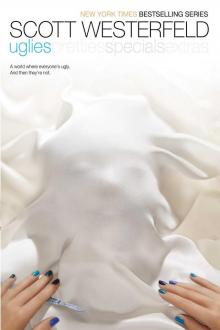 Uglies
Uglies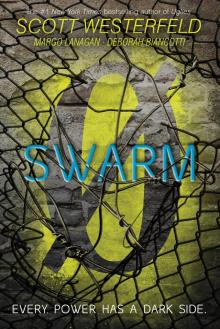 Swarm
Swarm Pretties
Pretties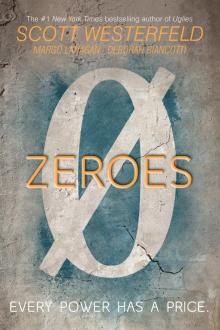 Zeroes
Zeroes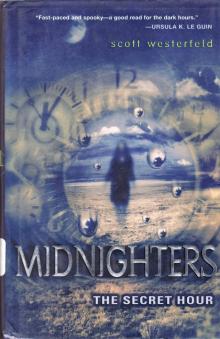 The Secret Hour
The Secret Hour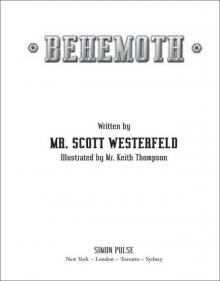 Behemoth
Behemoth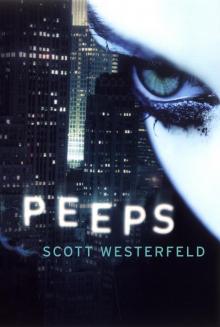 Peeps
Peeps Specials
Specials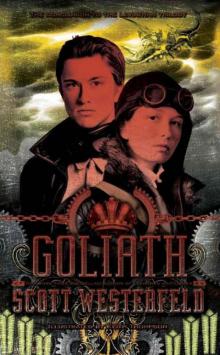 Goliath
Goliath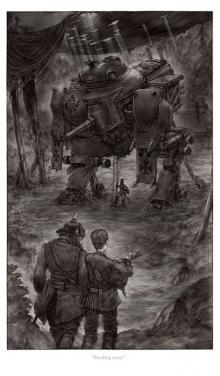 Leviathan
Leviathan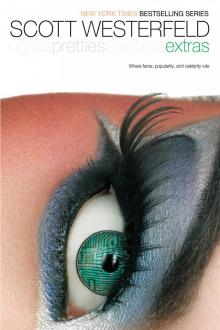 Extras
Extras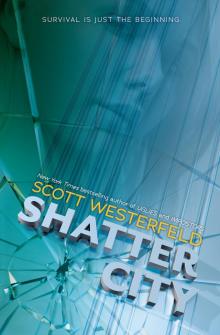 Shatter City
Shatter City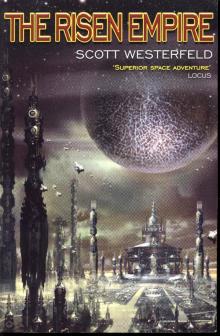 The Risen Empire
The Risen Empire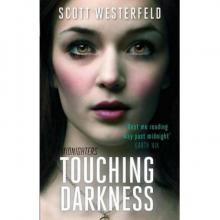 Touching Darkness
Touching Darkness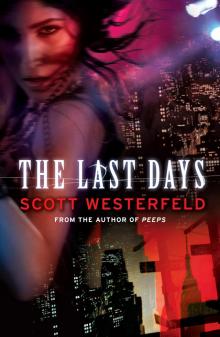 The Last Days
The Last Days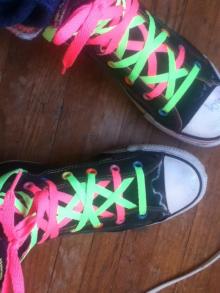 So Yesterday
So Yesterday The Killing of Worlds
The Killing of Worlds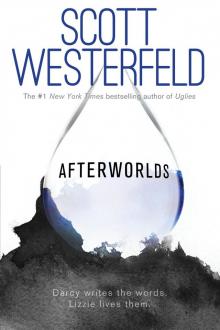 Afterworlds
Afterworlds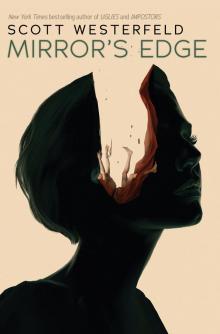 Mirror's Edge
Mirror's Edge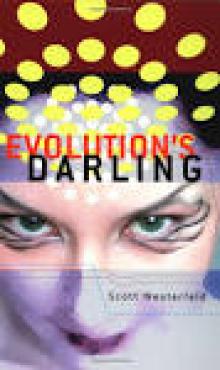 Evolution's Darling
Evolution's Darling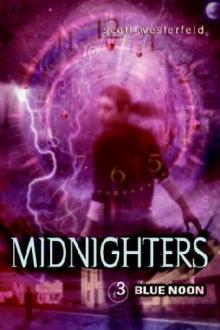 Blue Noon m-3
Blue Noon m-3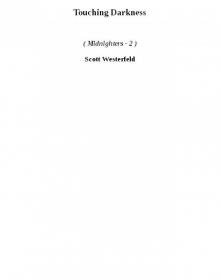 Touching Darkness m-2
Touching Darkness m-2 Impostors
Impostors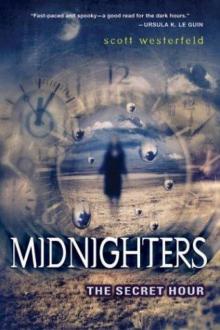 The Secret Hour m-1
The Secret Hour m-1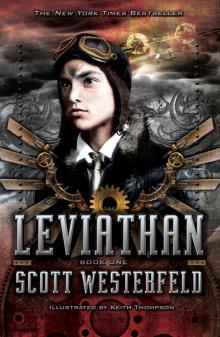 Leviathan 01 - Leviathan
Leviathan 01 - Leviathan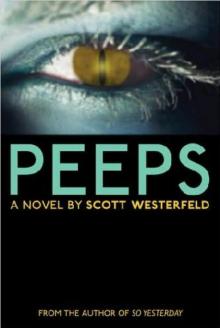 Peeps p-1
Peeps p-1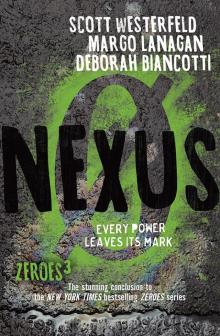 Nexus
Nexus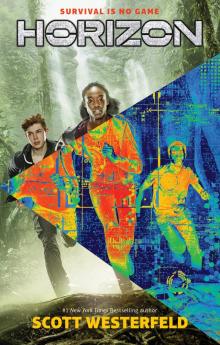 Horizon
Horizon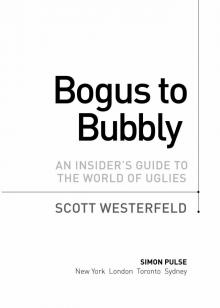 Bogus to Bubbly
Bogus to Bubbly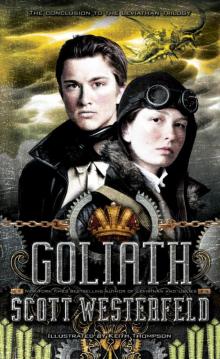 Goliath l-3
Goliath l-3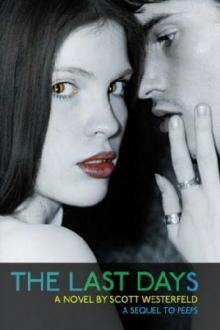 The Last Days p-2
The Last Days p-2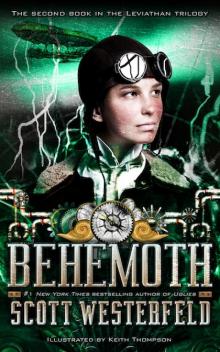 Behemoth l-2
Behemoth l-2 Stupid Perfect World
Stupid Perfect World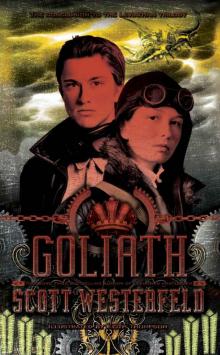 Goliath (Leviathan Trilogy)
Goliath (Leviathan Trilogy)